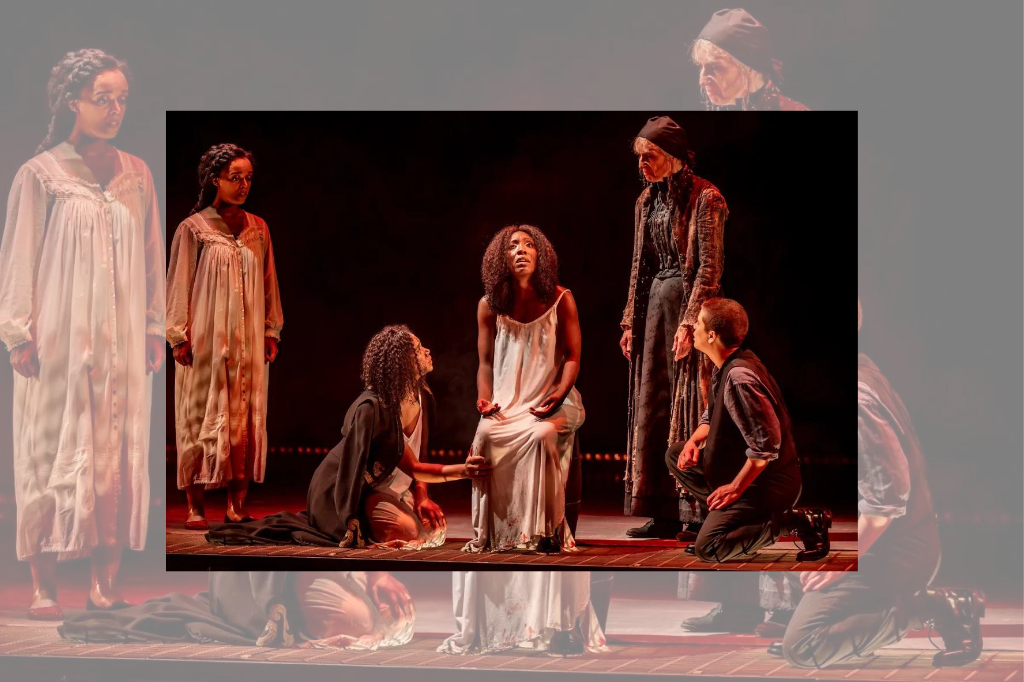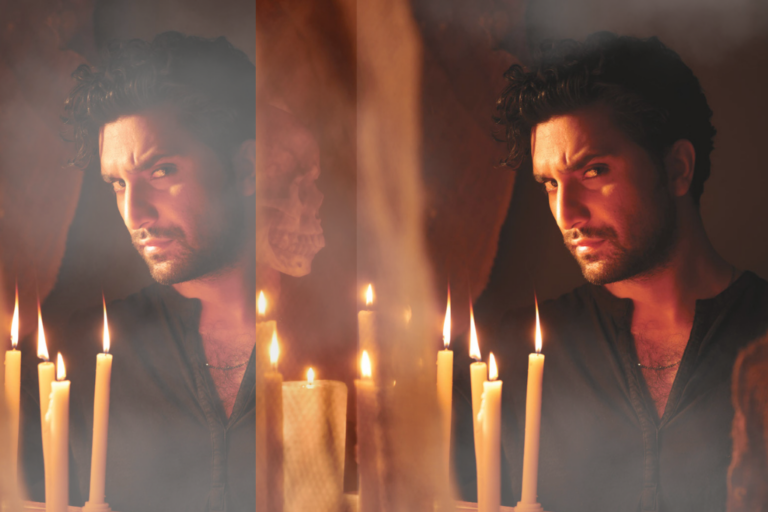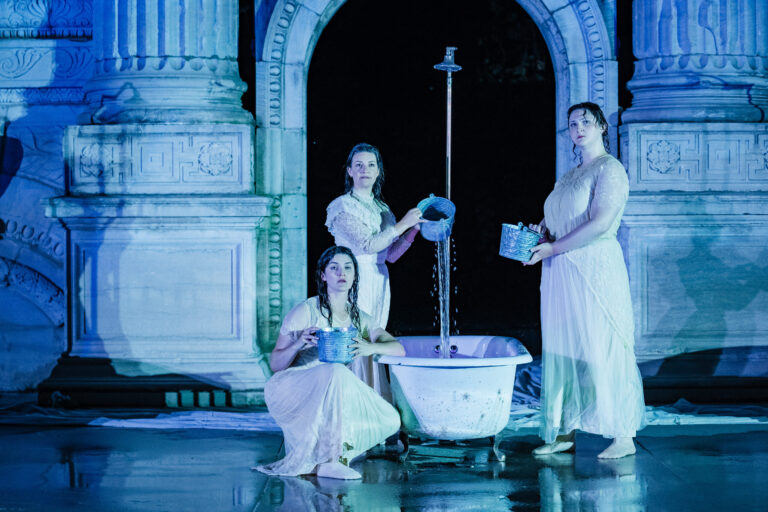REVIEW: Queen Goneril at Soulpepper
Aisling Murphy: Hi, Jessica Watson! We haven’t done one of these before.
Jessica Watson: Hi, Aisling Murphy. We have not done this before, and I can’t understand why.
AM: Right? In any case, today we’re talking about Queen Goneril by Erin Shields at Soulpepper, directed by Weyni Mengesha.
JW: I’m very excited that this particular play is our first joint review. You know I love classical theatre. And a modern response? Stunning, let me at it.
AM: Before we get started, let’s establish a baseline of what’s happening at Soulpepper. Brass tacks, Soulpepper is presenting King Lear and Queen Goneril in rep, the latter being a prequel to King Lear by about six or seven years. Queen Goneril allows us, to a certain extent, to understand what happened to Goneril and Regan to make them the way they are in King Lear.
JW: Although Queen Goneril is being loosely described as a prequel, I’m considering it as more of a modern response to King Lear. Because Shields has taken some artistic liberties with the show to justify the action of King Lear, I don’t know that this would necessarily equate to an exact prequel. But I definitely think it’s an interesting modern response to an antiquated text.
AM: Absolutely. And I felt that for both Queen Goneril and King Lear, there’s such a strong incorporation of [HBO’s] Succession, of all things. I know others have written about this too, but these themes of corporate-like power structures and power grabs are woven into both plays in a way that feels really interesting and relevant, even when some of the scenarios in Shakespeare’s plays don’t always feel the most tactile or or tangible to a modern audience.
JW: We should probably add to the record here that [at the time of this recording] Aisling has seen Soulpepper’s King Lear. Although I haven’t seen it yet, I’m quite familiar with the text, so that will probably colour some of our interpretations of this show.
AM: So throughout the course of Queen Goneril, we see some of the traumas that perhaps informed the sisters’ decisions in seven years later in King Lear. We get to know Goneril the most for sure, but we get the chance to know Regan and Cordelia quite intimately as well. I’m curious, how did you feel about the choices that Shields made in terms of what those events were?
JW: Again, that it’s a modern response to a very old text, so a lot of the situations that arose and the way that they were played very much stemmed from a modern socio-political perspective. Some of those choices worked very well, especially considering this is a play heavily centred around lineage and ascension. But there were a few choices that I didn’t think were necessary or warranted. But we’ll get to those later.
AM: There are elements of both Queen Goneril and King Lear where we see this really interesting encounter between the past and the present. For example, I loved the set — it’s the same set used for both shows, designed by Ken MacKenzie, where it’s this imposing, old-timey tower, almost like a Rapunzel tower sort of situation. But then you have Ikea furniture inside, and Ikea shelf dividers. That’s a neat friction between eras.
JW: Oooooh, those massive, tall heavy walls. They look like a nightmare to move, but I found the set design to be an incredible symbol of what these women were facing: the sheer size of the walls really made them feel like they were prisoners in their own homes. The design was a really cool way of merging eras and giving the story an authentic yet modern feel.
AM: The costumes as well. They were almost a modern punctuation on Elizabethan garb. Not quite as modern as in King Lear, whose costumes are really fun.
JW: I could not get over Cornwall’s burgundy velvet smoking jacket with the fur collar. I want that. I would wear that. Kudos to Judith Bowden, the costume designer for both productions — excellent choices were made. I also loved Goneril’s hunting outfit.
AM: Oh, yeah. Plaid on plaid on plaid.
JW: The ultimate Canadian expression.
AM: Aesthetically, the present informs the experience of the play quite a bit.
JW: Keeping with the juxtaposition of past and present, I appreciated the way the text presented the social issues in the story. Racism, sexism, misogyny, even the hierarchy of the royal family — these are issues that we can absolutely relate to in a modern context. It was interesting how those conflicts resonate in 2022, because obviously views on these topics have changed significantly since the 1600s. I mean… not as much as they should have. Sure, the ascension to the throne in Euro-centric cultures is more of a shifting of figureheads than anything else, as we can see from what’s happening in the UK right now. But it was interesting to see a representation of that struggle from a mixed viewpoint, somewhere between past and present.
AM: I found it interesting especially how you see these different facets of identity splinter in the context of the crown. So you get gender and in relation to the crown, like, oh, you can’t rule if you’re a woman, and race plays a different role in relation to the crown — you can’t rule if you’re “exotic.” But then what’s interesting about this play is how it touches on transness. Although it looks at non-binaryness and gender, it’s never in relation to the crown. It’s in relation to self, which makes it stand out as a playwriting device here, which I found interesting.
JW: Absolutely. We have the issues that we cannot control in relation to the crown, and issues we cannot control in relation to our personal identity. And that lack of control is so significant in all of Goneril’s relationships, both personal and professional. Which leads us to the titular character of the show: let’s talk about Virgilia Griffith as Goneril.
AM: I really appreciate those moments of quiet strength and conflict we get from Griffith. I just wish that she had been afforded more moments of subtlety in the text. She’s dealt a very complicated deck of cards by Erin Shields, and I think that she plays it as best she can under those circumstances.
JW: Everyone has multiple layers, right? We’ve all got our ego, our persona, and our truth. And I think that with this Goneril, we got to see a lot of her persona, we got to see a lot of her ego. I don’t necessarily know that we saw her truth, and I think that’s because she didn’t always have the opportunity to give us her truth. In Queen Goneril, Goneril is predominantly painted as a lover and a future queen, even when she’s on stage alone, even when she’s interacting with her sisters. I don’t think we ever really got to see just Goneril the woman.
AM: Yeah, I feel like no matter what, there is always some sort of imposed façade, either from a lover or a father or an obligation. I don’t think we ever get a crack in that façade, because even in those monologues they’re under the guise of obligation.
JW: I wish Griffith had a chance to really explore a moment of utter humanity as Goneril, allowing us to really see who this character is and what she wants beyond obligation and beyond her service to others. What she wants even beyond her lover. When you’re with a lover, especially a forbidden lover, you’re still trying to appeal to another person.
AM: And the moments with Olena, played very well by Breton Lalama, felt both opaque and insufficient. I don’t think that was in performance — I think it was in writing. Forgiveness came a little too easily for me, I think. We’ve seen Goneril do this terrible thing by throwing her lover under the bus in the name of preserving her own promise of power. It’s not even preserving her own power — she doesn’t have anything but the promise of power. And I felt like that was resolved a little too quickly. We don’t know what that relationship looks like after the events of the play, and I don’t really understand what it can look like after the events of the play. Goneril basically banished them beforehand.
JW: One character I really loved despite having a tiny role was Nancy Palk’s Old Woman. Her presence added so much to every scene, just through tiny looks and her tone of voice. That was a part where it would have been really easy to just kind of check out, and say, who cares? I mean, the character doesn’t even have a proper name, just Old Woman. But she has such presence, and with her stature and posture, she seemed very regal in some scenes — until you have her monologue about scrubbing the shit out of pots. What an interesting character. I want to play that character. Palk did an incredible job.
AM: She’s so good. I feel bad that we couldn’t wait to chat until you see King Lear, but the mirror between what she’s doing here and what she’s doing in King Lear as the Fool is fantastic.
JW: I didn’t know that. I’m honestly so used to Cordelia also playing the Fool, I just assumed that would be the case. But I see what you mean, Palk brings that sort of Fool’s energy. She’s so cheeky. And the role of the Fool is to speak the truth to the audience, to see past the façade, and that’s exactly what the Old Woman does.
AM: In Queen Goneril, you expect her to have a parental relationship with the king — and we see shades of that. Of course, that’s sort of that constabulary guidance, and a few intimate moments with Lear himself, but then seeing her play grandmother to Cordelia was so cute. Cordelia’s, like, I’m gonna go out in the rain and look for my sisters. And the old woman is like, okay, no, you’re not. It was this very sort of dry and parental approach to the character that I really, really liked.
JW: Speaking of the king, I’m dying to know how you feel about Tom McCamus in Queen Goneril? What did you think about the direction they took with King Lear?
AM: Having seen King Lear first, I really enjoyed his performance in Queen Goneril. And to be honest, I found myself almost wanting more of it, because I think so much of what colours the events of King Lear is the daughters’ relationships with their father. And we see that a fair amount with Goneril — we have a pretty good understanding of their dynamic by the end of the play, and especially with that final disappointment that Goneril gets from her father, which really sums up their relationship. But I wanted more of those moments between McCamus’ Lear and Helen Belay’s Cordelia and with Vanessa Sears’ Regan. McCamus is such a powerful chess piece of an actor and he’s so generous with his scene partners. Even if it wasn’t for speaking lines, I wonder what his presence on stage for different events might have done?
JW: I particularly feel like we got a very surface level understanding of his relationship with Cordelia. He clearly prizes Cordelia, but I wanted more of that relationship, especially because the play notes that the girls’ mother died giving birth to Cordelia. And it’s not even just about the relationship between Cordelia and Lear — I wanted to see how that relationship affected Goneril. It doesn’t hurt that Helen Belay is an incredible actor, and she convincingly portrays a Cordelia who would be, what, nine or ten? The daughters’ ages are never specified in King Lear, but from context I’d assume she’s between 16 and 20 in King Lear, so… still a kid in this show.
AM: I felt a little like there was a missed opportunity for using Cordelia, and it’s in the scene where Goneril is essentially mopping her dad off the walls when he’s drunk. She’s trying to get him into bed and he doesn’t want to go to bed, but he’s so so so drunk. He’s talking about how much he misses their mother and how unhappy he is and all the times that he used to have with the girls’ mother. And I wondered what would happen if he then sees Cordelia, who we’re told looks so much like her and is the reason her mother died. What happens when he sees her in that state?
JW: And again, how does that affect Goneril? I wanted to see how her father’s relationships with her sisters affected her. I was dying to know more about Regan’s dynamic in all this. Yeah. Even in King Lear, a lot of what’s happening is focused on Lear and Cordelia and Lear and Goneril. So I was burning to know why Regan’s relationship with her father is the way it is. Without mincing words, I really don’t think we should be using sexual assault as a plot device to justify why a woman might later behave badly. I think it’s an overused trope that doesn’t do justice to real-life victims or Regan’s character. I feel like there are a lot of justifications for women doing terrible things later on in life. And I don’t necessarily know that we have to use a horrible, devastating, and violent loss of bodily autonomy event to be like, “oh, well, that’s why she’s an awful person now.” It’s 2022, and it feels unnecessary.
AM: Yeah, I 100% agree with regards to how sexual assault is used as a plot mechanism here. I think that weaving that into the logic of someone’s character, the logic of someone’s psyche, sets a lot of traps both for the story and for the actor, and not in a way that I particularly appreciated. What I appreciated about Sears’s performance is that she gives those shades of yearning. We just don’t get that yearning ever really answered or, like you said, volleyed forwards.
JW: She does such a good job of creating these circumstances and scenarios where, as an audience member, you know exactly what she’s thinking. But it would have been nice just to have one of those moments come out into a slightly more fruitful discussion between father and daughter. Sears is such a force, she still managed to really dig her teeth into Regan and make her a charming, playful young woman — a very cool contrast with what happens in the original play’s text — but I wanted to see her volleying with Lear more and see the way that impacts her older sister.
AM: I appreciated that teenage/early 20s frontal-lobe development was still really clear in both Goneril and Regan: we see that impulsivity and it’s not not presented in a sexist, flighty way. It’s genuinely young people feeling everything with much higher stakes than it is, which I really appreciated in both the performance and the direction as well.
How did you feel about Oliver Dennis as Gloucester?
JW: Oliver does a really good job of playing an understated imposing presence. He can so effortlessly create that classic villain without being outwardly or obviously villainous. You can just tell because his Gloucester was that type of smarmy dude. He was giving me Littlefinger from Game of Thrones. I just liked his approach to the character. He didn’t go straight the route of I’m a bad guy. He used charm as a weapon, so when it was revealed he is a terrible person, it didn’t feel surprising, but in a very satisfactory way.
AM: It was interesting that in Queen Goneril, his character felt similar to his role in Where the Blood Mixes, but in King Lear, which is the last thing I saw him in, his Gloucester is very different. So it was cool to see that sort of echo of, not necessarily ignorance, but almost kind of stupidity about the world, and about the character’s relationship in the world. Dennis does that brilliantly. He really navigates that smarmy, gross, and sort of dumb character really well.
JW: He adds such depth to characters who are written in such a specific way that it’d be easy to go with a surface level interpretation of who he is. I have to say, although the purpose of this play is giving a voice to the characters who, generally speaking, are voiceless in Lear, I wish we’d gotten a little bit more interaction with Albany and Cornwall. Not because I want the show to be about men. But Gloucester had such a profound impact on Regan, obviously through his assault, and I really wanted to know more about these women’s relationships. This play takes place in a time where if any woman wants to ascend to the throne, she must marry a husband. As an audience, we know these women are going to have to marry. That’s a massive, massive life change for these women in which they have absolutely no power. And if we’re giving a voice to the powerless, I really want to see these women interact with their potential future husbands to see how it affects them and how they feel about it.
AM: Absolutely.
JW: And although I haven’t seen this King Lear, I know who Cornwall and Albany are in the text and how their wives feel about them. But I would have been really interested to know who Cornwall and Albany are in Queen Goneril, and how that affects the women who have to marry them.
AM: And Sears and Riccio as Regan and Cornwall have incredible chemistry in King Lear. At the end of Queen Goneril, when you see Regan realize her dad set that partnership up, I want to know what their first five minutes alone would look like. Because when you have (for the record, Intermission publisher) Philip Riccio and Vanessa Sears working together, it’s electric and I wanted more of that volleying.
JW: We really don’t see them interact until the moment of their engagement. And the engagement comes so soon after Regan is assaulted, I wanted to see how she interacts with a man she has no choice in marrying so soon after she’s had this horrendous thing happen to her. You’ve had someone invade your body, you’ve had something taken from you. And then to be told, and now I’m giving you away to someone else, you are their property? I wanted to see the fallout of that, because to me, that’s Regan’s story. She’s the middle child. She’s not the favourite. She has no choice.
AM: Like you said, it’s a play about the women and it’s a play about the relationships both between the women and between the women in the world, but I did yearn for some of that external conflict as caused by the patriarchy, you know?
JW: Absolutely. That being said, I was pleased with how true the story stayed to featuring the women’s stories. Leading up to intermission, I was worried because it had been a lot of Goneril and Lear. We’ve seen some interaction between the sisters, but I want to see these sisters really interact. Then it happened in the second half, and I’m so glad it did. In addition to their individual strengths as actors, Griffith, Sears, and Belay really came to life and found new layers when playing together. That scene where they were out in the storm, the one that parallels King Lear, I wanted to weep when they found each other. I wanted all the other characters to leave, and I just wanted to watch them in their moment. They created such an incredibly harmonious narrative of these three sisters who have their issues, but ultimately are in the same circumstance, regardless of who’s their father’s favourite, regardless of who’s the oldest.
AM: I just had a thought: that moment in the second act when they’re burning the bodies was lovely. It was well directed, Kimberly Purtell’s lighting was super effective, and it was just a lovely piece of theatre. Listen, any Intermission reader knows that I am a theatrical haze fan first and a journalist second. And anytime there’s smoke onstage, in my opinion, you can just give it a Dora then and there.
JW: We haven’t talked about the inimitable Sheldon Elter as Kent! Look, I just want to start by acknowledging that he did multiple push-ups with a grown human woman on his back. And I’ve heard he lifts multiple people in King Lear. And he was super physical in Where the Blood Mixes — the man could cancel his gym membership, because Soulpepper is giving him the workout of his life.
AM: I was impressed.
JW: In a world in which we have finally started to acknowledge that there are very few roles, let alone good roles, for women in theatre, Kent is a role that seems to be gender-swapped often. I think the last six productions of King Lear I’ve seen have had a female Kent. To be fair, they were all in the UK, and they don’t bat an eye at gender-diverse casting over there. So I was almost surprised to see a Kent who is not only male, but an inherently masculine presence. I know he’s written as a man in the classical text, but this was a new level of almost frat-bro proportions. But that nice frat bro, you know? I just thought that was a really strong choice, and I can’t wait to see how that contrasts with the brilliant yet volatile Kent of the other production.
AM: I love that sort of grounding presence Elter has on stage. He’s really good at keeping things anchored, and as well his chemistry with the women is great. He really does emanate that fun uncle energy and it’s fantastic.
JW: The last person I want to talk about is Jonathon Young as Edmund. I’ll admit that at first I wasn’t sure how or if this casting would work. As with Regan and Goneril typically being women in their 30s/40s, I’ve only ever seen Edmund cast as a 20-something little fuckboy. I wasn’t expecting this stately, level-headed man to walk on stage. But he brings so much nuance to the character. Young really understands how to play the internal and external simultaneously. I mean, that’s what acting should be, but not everyone can accomplish that with such subtlety. He really was able to show that character’s internal conflict without slapping us in the face with it. We all know that in King Lear, Edmund is not particularly sympathetic. He’s a shitty dude. But it was lovely to see this younger, empathetic and caring yet deeply wounded Edmund. Young’s approach to Edmund was clever — it really makes me want to know what transpires over the next seven years to make this sensitive person become a wounded, raging animal.
AM: I don’t know if I’m stretching this too far, but I think with Edmund, we’re seeing what happens when something that’s innate to his identity — the fact that he’s a bastard — is the thing that’s haunting him. It’s not something that someone has done to him, and it’s not something that has happened to him. It’s something that he is. He’s a bastard, and it festers. It was a much more organic way to pursue what the characters were seven years prior to King Lear than to shoehorning in an assault, you know?
JW: Exactly! We didn’t need a plot device to justify his character. We can imagine the transition, from him being a bastard being just an ever-present reminder in the back of his head to, seven years later, being the core of who he is. And I really appreciated the few scenes that we had between him and Gloucester, because it brought that reminder forward. As fantastic as Damien Atkins is, we really didn’t need to see Edgar and Edmund interact until the very end, because at this point in Edgar’s life, his resentment hasn’t swollen to include his brother. And I can’t wait to see what they do with that relationship in King Lear.
AM: Are you seeing an evening show of King Lear? Caffeine. Caffeinate before.
JW: I honestly get really excited by long classical shows, especially when they’re good. And judging from Queen Goneril… King Lear is going to be good.
Queen Goneril runs at Soulpepper August 25 – October 2, 2022.
















You should take part in a contest for one of the best blogs online.
I am going to recommend this blog!